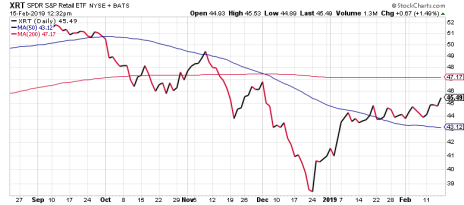No comparison to the 2008-2009 recession era is flattering. But that’s what U.S. retail sales were compared to after falling 1.2% in December—the largest month-to-month decline since September 2009. Naturally, U.S. retail stocks responded by … wait, this can’t be right … vaulting to new 2019 highs?!
What gives? True, the stock market as a whole easily shrugged off last Thursday’s bleak retail report, continuing its recent slow-and-steady advance. But retail stocks actually outperformed the market on Thursday and Friday, with the SPDR S&P Retail ETF (XRT) breaking above two-and-a-half-month resistance at 45 (see chart below).
Clearly, investors aren’t worried about what the dire December report means for retail stocks. Or at least they aren’t yet. I have a few theories as to why.
3 Reasons Retail Stocks are Holding Up
[text_ad use_post='129629']
1. The retail sell-off was already baked in after the fourth-quarter market correction. This is the most logical explanation and not exactly an original thought. Like most stocks, retail stocks took it on the chin in the last quarter of 2018. In fact, they were one of the worst-performing sectors. After peaking at 52 the second week of September, the XRT plummeted all the way to 38 by Christmas—a drop-off of just under 27%. High stock valuations after a nine-year bull market, and the ongoing U.S.-China trade war were blamed most for the steep market decline. But it’s possible, especially given that the worst of the selling happened in December, right up until Christmas shopping season ended, that hedge funds and other institutional investors were acting on inside information that December sales were grinding to a halt. The market, after all, is a forward-looking entity.
2. Retail stocks are still undervalued. This is also relatively plain to see. After all, at 45, the XRT ETF is still well off its September highs. Plus, on a price-to-earnings (P/E) basis, many of the biggest retail names remain modestly valued even on the heels of the recent run-up. Just look at these P/E numbers from some blue-chip retail stocks:
Best Buy (BBY): 15.7
Home Depot (HD): 21.0
Lowe’s (LOW): 23.2
McDonald’s (MCD): 23.7
Target (TGT): 12.1
Walgreens (WBA): 13.4
Mind you, those six stocks are up an average of more than 17% from their late-December bottoms, so their valuations were even lower two months ago. But with all six still trading well below their 2018 highs, they’re still undervalued stocks, with plenty of room left to run.
3. The trend is all that matters now. To paraphrase Tim Lutts, Cabot’s CEO and Chief Investment Strategist, trends on Wall Street last longer than anyone expects. The fourth-quarter correction felt interminable, and it seemed like stocks were overly punished, sentenced to 10 years in prison for jaywalking. But no one could stop the trend once things started rolling downhill. The reverse is happening now. Eventually, stocks will pull back again, including (and perhaps especially) retail stocks. But not until the market makes enough believers out of an investing public that’s still a bit gun-shy after what happened at the end of last year.
What to Do Now
So, does this mean you should buy retail stocks, ominous December sales report be damned? Not exactly. The undervalued retailers mentioned above look fairly safe at the moment. But there are plenty of names that have become quite richly valued, including Nike (NKE), Lululemon (LULU) and Starbucks (SBUX), all trading at 52-week highs and sporting lofty P/E ratios.
And while no damage has been done to the sector yet, dark clouds could be forming.
Here’s what Crista Huff, chief analyst of Cabot Undervalued Stocks Advisor and our growth and value expert, has to say about the current state of the retail market:
“The problem with retail stocks is the same problem that I’m seeing throughout American business right now. Many companies experienced outsized earnings growth in 2018, and they’re projected for much slower, more normal earnings growth in 2019. My recent review of 19 apparel retailers turned up only four that are expected to achieve strong double-digit earnings growth this year. Two of those are distinctly overvalued – Lululemon (LULU) and Under Armour (UAA). The other two are attractive undervalued growth stocks that appear in my Cabot Undervalued Stocks Advisor portfolios.”
To learn the names of which two undervalued retailers Crista likes, click here.
In the meantime, you don’t need to avoid the retail sector like the plague based simply on last week’s unflattering report. But it should at least serve as a yellow caution flag if you do decide to wade in.
[author_ad]

